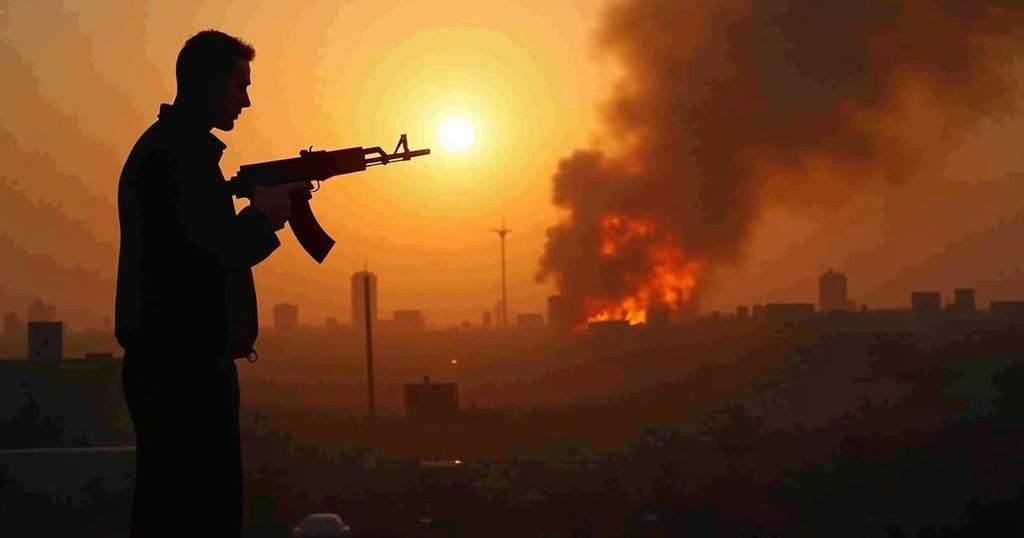A recent Israeli airstrike in central Beirut resulted in the deaths of three leaders from the Popular Front for the Liberation of Palestine (PFLP), marking Israel’s first attack within the Lebanese capital since 2006. Concurrently, Hamas confirmed the killing of its leader in Lebanon, Fateh Sherif Abu al-Amine, during a separate strike. Casualty figures indicate over 1,000 fatalities among the Lebanese population in recent weeks along with significant displacements. The situation remains precarious, raising concerns over regional instability and demands for a diplomatic resolution.
Early on Monday, a significant airstrike in central Beirut has resulted in the deaths of three leaders from the Popular Front for the Liberation of Palestine (PFLP) as reported by the militant group involved in the ongoing conflict against Israel. This attack marks Israel’s first military strike within the capital of Lebanon since 2006. Eyewitnesses described frightful scenes with massive destruction evidenced by two stories of an apartment building being reduced to rubble and the bodies of victims seen in stark contrast atop cars below. The drone strike was reportedly executed near the Kola intersection, a well-known area in Beirut where public transport is heavily utilized. Concurrently, Hamas has confirmed that its leader in Lebanon, Fateh Sherif Abu al-Amine, was also killed in a separate airstrike on the Al-Bass camp located in the south of Lebanon. This development follows reports of increasing violence across the region with over a hundred lives lost due to strikes in Lebanon on Sunday alone, reflecting the escalating intensity of the conflict. The Lebanese government’s health ministry indicated that more than 1,000 Lebanese have perished and around 6,000 have been injured amidst the ongoing conflict, displacing approximately one million individuals, which accounts for about a fifth of the population. In response to the situation, White House National Security Spokesperson John Kirby stated that Israel’s airstrikes have had a profound impact on Hezbollah’s command structure, while warnings were issued regarding the group’s efforts to reconstitute its leadership. President Biden has indicated his intention to communicate with Israeli Prime Minister Benjamin Netanyahu to advocate for the avoidance of a broader war in the region. The situation remains fluid as Iran and Saudi Arabia issue statements regarding their positions on Lebanese sovereignty and regional security amidst these significant upheavals.
The recent escalation of violence in the Middle East, particularly involving Lebanon, Israel, and various Palestinian militant groups, reflects a complicated geopolitical landscape. The long-standing conflict between Israel and Palestine has been further complicated by the involvement of Hezbollah and Hamas, both of which receive varying degrees of support from actors such as Iran. The recent airstrikes, attributed to Israel’s military, are unprecedented in their intensity and scope, especially given that the last significant strike within Beirut occurred over fifteen years ago. This indicates a grave escalation in the tension present in the region, with international implications surrounding responses from various nations, including the United States, Iran, Saudi Arabia, and Syria, each of whom has expressed their reactions to the ongoing crisis. The humanitarian impact of the conflict is also profound, with mass displacements and casualties reported, underscoring the urgent need for international attention and potential diplomatic intervention to de-escalate a volatile situation that has been tragically ongoing for decades.
The situation in Lebanon represents a critical juncture in the Middle East crisis, particularly due to the recent Israeli airstrikes that have resulted in significant casualties among Palestinian militant leaders and civilians alike. As both Hamas and PFLP reported losses, and with an alarming number of fatalities among the Lebanese populace, the necessity for international dialogue and strategic intervention grows increasingly urgent. The political ramifications within Israel and reactions from regional powers could potentially alter the course of forthcoming engagements. Thus, there exists a crucial need for comprehensive solutions that address not only the immediate violence but also the underlying tensions fueling this protracted conflict.
Original Source: www.theguardian.com






